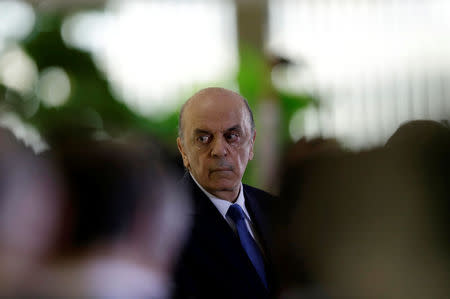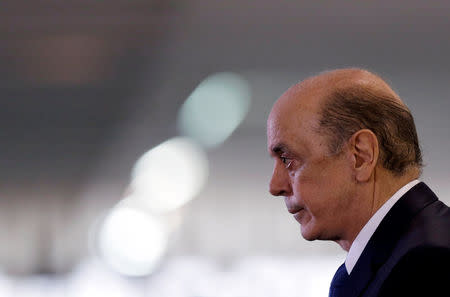Brazil's new top diplomat shifts focus from ideology to trade
By Anthony Boadle BRASILIA/BUENOS AIRES (Reuters) - The arrival of a tough-talking foreign minister in Brazil marks a move away from ideologically-driven diplomacy that raised tensions with the United States and towards a big push on trade. Jose Serra's first foreign visit to Argentina on Monday focused on restoring South America's Mercosur customs union to its purpose as a free trade area, after Venezuela's entry in 2012 turned it into a left-leaning political forum. The suspension of Brazilian President Dilma Rousseff to face an impeachment trial and her replacement by centrist Michel Temer has pushed the political pendulum toward the centre in South America after the election of a centre-right government in Argentina last year. "Diplomacy will once again reflect the values of Brazilian society and the interest of its economy, and no longer be at the service of the ideological preferences of one political party and its allies abroad," Serra said in his first speech as minister last week. His first move as Temer's foreign minister was to strongly rebuke Venezuela, Cuba, Bolivia, Ecuador and Nicaragua for interfering in Brazilian affairs by describing Rousseff's removal as an illegal "coup." Venezuelan President Nicolas Maduro, who is resisting opposition calls for a referendum to oust him in the midst of a painful recession, recalled his ambassador from Brasilia for consultations. Serra is under pressure to act against Maduro. The chairman of Brazil's Senate Foreign Relations Committee urged the government to trigger Mercosur's democratic clause and have Venezuela suspended. Maduro's government "is fast becoming an open dictatorship," Senator Aloysio Nunes told Reuters. REVIVING MERCOSUR The 74-year-old Serra is a prominent senator who would like to use his ministerial post as a springboard for a third bid for the presidency. His success may hinge on keeping his pledge to open new export markets for Brazil's tanking economy. His ministry has been given increased authority to negotiate trade deals. He plans to increase trade with traditional markets like the United States and the European Union, as well as more recent ones such as China, which has quickly risen to become Brazil's biggest export market. Relations between Washington and Brasilia cooled during the 2003-2010 government of Luiz Inacio Lula da Silva, who prioritised South-South relations but also raised Brazil's international profile while the economy was booming. Rousseff, his successor, was less rigid but ties with the United States were badly shaken in 2013 by reports of U.S. spying on Brazil, which prompted her to cancel a state visit to Washington. Serra said improved U.S. relations were inevitable and will rely on easing trade barriers between the two largest economies in the Americas. "There will be greater alignment between the United States and Brazil on some global issues," said Michael Shifter, president of the InterAmerican Dialogue, a Washington-based policy group. Argentina will be fundamental in Brazil's renewed quest for trade as the top destination for Brazilian manufactured goods. In seeking to revive Mercosur, Serra will also ask the customs union to be more flexible on members reaching bilateral accords. His plans were applauded by business leaders. "Mercosur must be more proactive, less closed," the head of Brazil's most powerful industry lobby CNI, Robson Andrade, said. "Instead of political debates it should be negotiating international accords, such as with the European Union." Mercosur's swing to the right has raised hopes for a trade deal with the European Union, which could create a market of 750 million people but has faced setbacks since talks began in 1999. Serra was quick to play down expectations of a quick deal. "I don't think anything crucial will happen in the next six months," he said in Buenos Aires on Monday. "We must study the offers [from the Europeans] well." IMPOVERISHED ITAMARATY An intellectual who works late into the night and often sleeps through midday, the blunt and abrasive Serra would appear to be the least diplomatic figure to run Brazil's foreign policy. But the appointment of this high-profile politician to lead Itamaraty - as the foreign ministry is called - was welcomed by Brazil's respected diplomatic corps, largely sidelined by Rousseff. The ministry was underfunded to the point that diplomats posted abroad have been unable to pay their rents. Serra promised to put the ministry back at the centre of government and rescue it from "penury" by covering a funding shortfall of 800 million reais (£154.7 million). Brazil is in arrears on contributions to the United Nations and other multilateral organizations by $852 million, a debt that threatens its right to vote, Serra told O Estado de S.Paulo newspaper on Sunday. Workers Party governments created 48 new embassies during 13 years in power, many in Africa and the Caribbean to win votes at the United Nations, where Brazil unsuccessfully sought a permanent seat on an expanded Security Council. Serra, pointing to the absurdity of Brazil having more embassies than Britain in the English-speaking Caribbean, plans to study the benefits of its 139 embassies and close those that are unproductive. (Reporting by Anthony Boadle; Additonal reporting by Alexandra Ulmer in Caracas, Maximiliano Rizzi in Buenos Aires; Editing by Mary Milliken and Andrew Hay)

 Yahoo Finance
Yahoo Finance 

